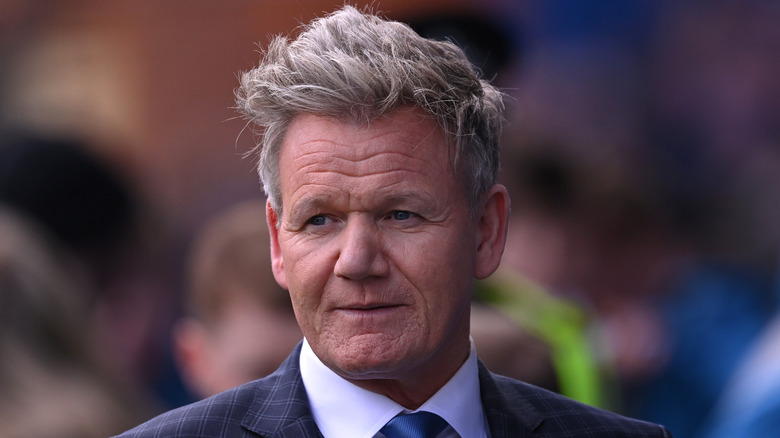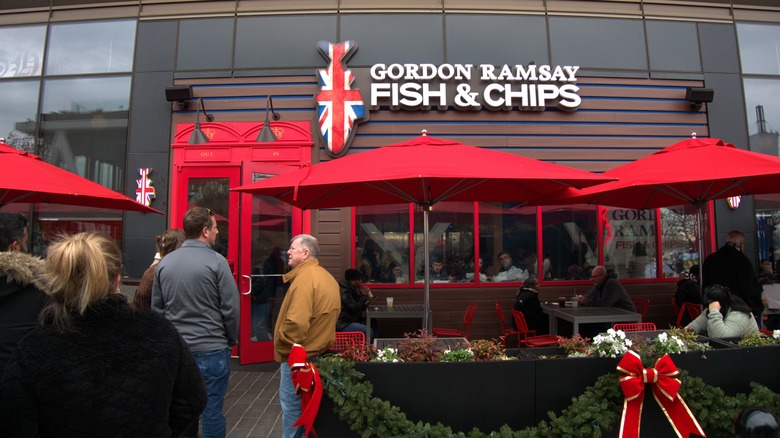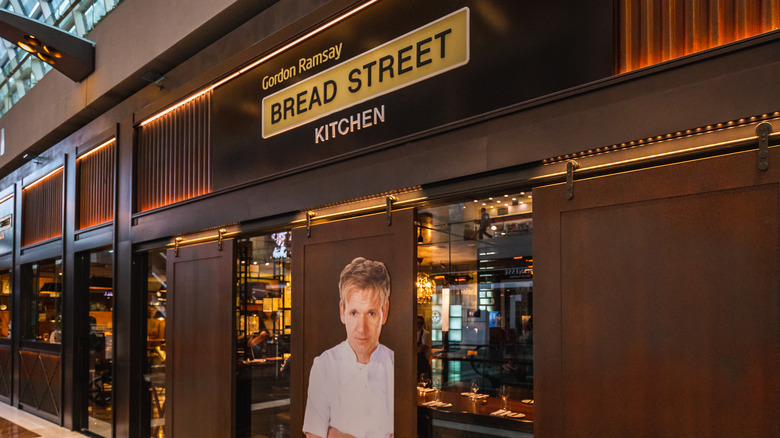Gordon Ramsay Owns Way More Restaurants Than You Realize
British chef Gordon Ramsay may be best known as a TV chef on shows like "Hell's Kitchen" and "Kitchen Nightmares," but he's also a serious restaurateur. As in, he has 81 different restaurants to his name, which run the gamut from Michelin starred fine dining down to casual pizza and burger spots in malls. That empire spreads across at least ten countries — beyond the U.S. and the U.K., he has outposts in France, China, and Qatar, to name just a few. Depending on how you measure it, he's arguably the celebrity chef with the biggest footprint in the world when it comes to restaurant ownership — although others like Alain Ducasse (34 restaurants) and Wolfgang Puck (at least 30 restaurants) are hardly lightweights.
Despite Ramsay's reputation for haute cuisine, only a handful of his 81 establishments are fine dining restaurants. His establishments currently hold eight Michelin stars all together (though he's received 17 throughout the course of his career), and the stars are spread across five restaurants that mostly focus on classical French cuisine. At the top of the list is the eponymous Restaurant Gordon Ramsay in London, with three stars, known for dishes like lobster langoustine and sweetbreads. Le Pressoir d'Argent, an elegant destination in Bordeaux, France, has two stars. Pétrus (in London), Au Trianon (outside Paris), and Restaurant 1890 (in London) all have one star, with 1890 receiving its first star in 2024. Ramsay also has high-end restaurants without Michelin stars, such as London's Savoy Grill and three locations of Lucky Cat, where he branches out into Japanese cuisine.
Ramsay has a sprawling casual restaurant empire
While Gordon Ramsay may not appreciate the term, much of Ramsay's empire consists of his own chain restaurants — the same concepts, transplanted into various, sometimes international locations. Most of these are more casual. For example, in the United Kingdom, Ramsay has seven outlets of Street Pizza, a casual eatery with creative pizza toppings and some American-style options like ribs, and a party vibe if you dine in. Street Pizza has a presence abroad in places like Dubai, although these seem to be treated somewhat separately from the U.K. entity, as they're not even listed on its official site.
His other U.K.-focused chain, Street Burger, follows the same approach but obviously, with burgers. Overseas, there's no Street Burger but instead, you've got Gordon Ramsay Burger, with a similarly American vibe and locations in the U.S., Canada, Qatar, South Korea, and beyond. This is just scratching the surface, too: There's also Bread Street, focusing on Ramsay classics like beef Wellington; Gordon Ramsay's Hell's Kitchen, serving dishes from his long-running TV competition; and Gordon Ramsay Fish & Chips, which obviously serves that classic British dish. Whether or not these concepts count as fully-fledged chains could be debated: He's hardly trying to emulate McDonald's, and many of these concepts have just a handful of locations. But, the strategy is chain-like: Find a concept that works, and repeat.
But does Ramsay work in any of his restaurants?
With 81 restaurants, it's probably safe to assume Gordon Ramsay is not frequently present in most of his establishments. Hypothetically, if he were to split his time evenly, he'd only be able to spend four to five days per year in each location — without factoring in his regular TV commitments or any days off. Anecdotal reports suggest Ramsay does put in face time at his high-end restaurants, although he's probably more focused on quality control rather than working behind the burners. (For the record, when Ramsay does appear, his staff report that he's a lot friendlier than his TV personality would make you believe.)
This is hardly unusual: Many celebrity chefs rarely ever work in their restaurants, and some (for example, the late Joël Robuchon), effectively never even visit some of them. However, they (or their companies) presumably vet their chefs strictly to maintain quality and exercise some influence over menus and operations. In some cases, chefs effectively just license their name out to put on a restaurant, and don't have much of anything to do with restaurants bearing their name. (Sometimes there's a middle ground: British chef Jamie Oliver's restaurants, for example, are sometimes run in conjunction with some external company). Ramsay may be doing this to some degree: His restaurant company's website has a section dedicated to franchising. However, it's unclear how many of his 81 restaurants are franchise operations that are essentially outside of Ramsay's purview.


